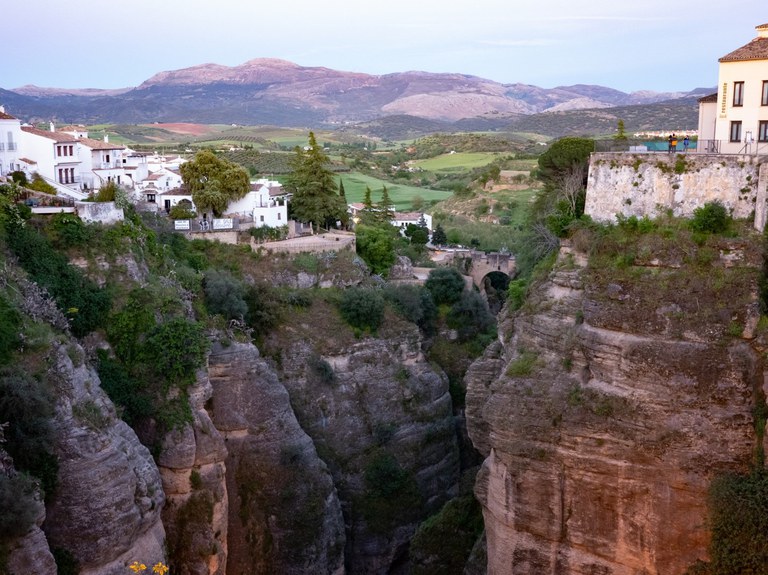Posted: July 2, 2019
Because of this opportunity, I’ve become more confident about traveling, and I feel better prepared for our global world.

The view of El Tajo, the gorge running through the city of Ronda, with a view of the Sierra de las Nieves in the background.
"¡Hola chico! ¿Qué tal?" my host mom greeted me, thus beginning a six-week whirlwind of studying, traveling, and becoming educated in the culture of southern Spain. It was also entirely experienced in Spanish.
The program involved nine credits of language study, a homestay in the small city of Ronda, Spain, and lots of travel. We visited seven cities: Granada, Sevilla, Salamanca, Segovia, Madrid, Toledo, and Cádiz. We toured (and gave tours of) museums, monuments, palaces, and the streets of a number of locales. The food was fantastic, and the people were amazing.
One of the most memorable experiences I had was giving a tour of the Alhambra, a Moorish palace complex constructed primarily between the 9th and 14th centuries AD. It was stunning, and that was with most of the colors already having worn away or faded from the stone walls! Being able to explain the history in the halls for roughly an hour to about ten other people, all in Spanish, was exhilarating and confidence-building.
I also enjoyed picking up conversations with locals. I would accompany a friend, who was required to do it for coursework, and we would go around the city asking shopkeepers about their town. Sometimes it was difficult to understand the discussion because of their accent, but when I could it was a lot of fun. It gave me a taste of the local culture, as well as the diversity in people's personalities and ideas. It also greatly improved my Spanish.
The Ronda Program was not directly related to my Environmental Resource Management major, but it did allow me to peer out a window to the non-American world. I learned how to discuss and debate productively in another language. I studied how linguistics explains why some people talk differently than others, and how that can affect social stratification. Moreover, besides the obvious benefits of improving skill in a second language, I am better able to learn additional languages more easily. This is important, as I intend on studying theology and biblical studies in grad school, for which a number of languages are necessary (e.g., Greek, which I am learning at the moment). Spanish in general is also ubiquitous, and I've even been able to make use of it helping guests at my summer job. I may find it useful in explaining environmental, political, and religious issues and topics to diverse communities in the future. I discovered much about myself in Ronda as well, and have continued to reflect on my identity and what it means to be fulfilled as a result.
It wouldn't surprise me if this trip becomes a stepping stone to more excursions outside the US. Because of this opportunity, I've become more confident about traveling, and I feel better prepared for our global world. I'm thankful to have been given the opportunity to attend!
Ag Sciences Global
Address
106 Agricultural Administration BuildingUniversity Park, PA 16802
- Email globalag@psu.edu
- Office 814-863-0249
- Fax 814-865-3055
Ag Sciences Global
Address
106 Agricultural Administration BuildingUniversity Park, PA 16802
- Email globalag@psu.edu
- Office 814-863-0249
- Fax 814-865-3055

